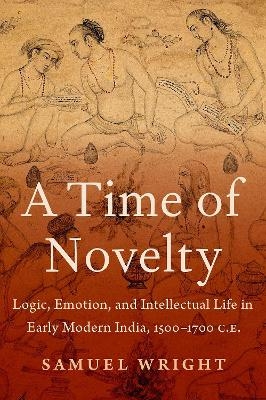
A Time of Novelty
Logic, Emotion, and Intellectual Life in Early Modern India, 1500-1700 C.E
Seiten
2021
Oxford University Press Inc (Verlag)
978-0-19-756816-3 (ISBN)
Oxford University Press Inc (Verlag)
978-0-19-756816-3 (ISBN)
In A Time of Novelty, Samuel Wright re-envisions the relationship between philosophy and history in premodern India. This relationship is studied through the tradition of Sanskrit logic between 1500 and 1700 CE -- the period in Indian history that witnessed the ascendency of the Mughal Empire. During this period, Sanskrit logicians would refer to themselves and their arguments as 'new,' indicating that the concept of novelty was at the center of their philosophical project. By retaining space for emotion when studying intellectual thought,this book recovers both what it means to “think” novelty and to “feel” novelty for these thinkers.
Focusing on a number of little-known essays by early modern Sanskrit logicians, Wright argues that the concept of novelty is used to forge a new philosophical community in this period where novelty is both an intellectual and affective category. This perspective allows the book to raise questions that have never been asked when studying Sanskrit logic -- questions concerning critical thought, mood, imagination, and manuscript culture. Wright expands the ways in which we study philosophical thought by considering philosophy as deeply immersed in the felt experiences of one's life, at the confluence of thinking and feeling.
Focusing on a number of little-known essays by early modern Sanskrit logicians, Wright argues that the concept of novelty is used to forge a new philosophical community in this period where novelty is both an intellectual and affective category. This perspective allows the book to raise questions that have never been asked when studying Sanskrit logic -- questions concerning critical thought, mood, imagination, and manuscript culture. Wright expands the ways in which we study philosophical thought by considering philosophy as deeply immersed in the felt experiences of one's life, at the confluence of thinking and feeling.
Samuel Wright is Assistant Professor at Ahmedabad University. His research area is the history and philosophy of premodern South Asia.
Preface and Acknowledgments
List of Maps
List of Tables
English Translations of Sanskrit Titles
Map 1. Early Modern South Asia: select towns and cities
Note on Transliteration
Introduction
Part I. Newness and Emotion
Chapter 1 - Doubt
Chapter 2 - Objectivity
Part II. Feeling and Reasoning
Chapter 3 - Happiness
Chapter 4 - Dying
Part III. Space and Time
Chapter 5 - Space
Chapter 6 - Time
Conclusion: A Time of Novelty
Appendix
Bibliography
Index
| Erscheinungsdatum | 02.06.2021 |
|---|---|
| Verlagsort | New York |
| Sprache | englisch |
| Maße | 241 x 163 mm |
| Gewicht | 567 g |
| Themenwelt | Geisteswissenschaften ► Geschichte ► Regional- / Ländergeschichte |
| Geisteswissenschaften ► Philosophie ► Östliche Philosophie | |
| Mathematik / Informatik ► Mathematik | |
| ISBN-10 | 0-19-756816-5 / 0197568165 |
| ISBN-13 | 978-0-19-756816-3 / 9780197568163 |
| Zustand | Neuware |
| Haben Sie eine Frage zum Produkt? |
Mehr entdecken
aus dem Bereich
aus dem Bereich
Universalgelehrter, Polarreisender, Entdecker
Buch | Hardcover (2024)
mareverlag
CHF 39,20


